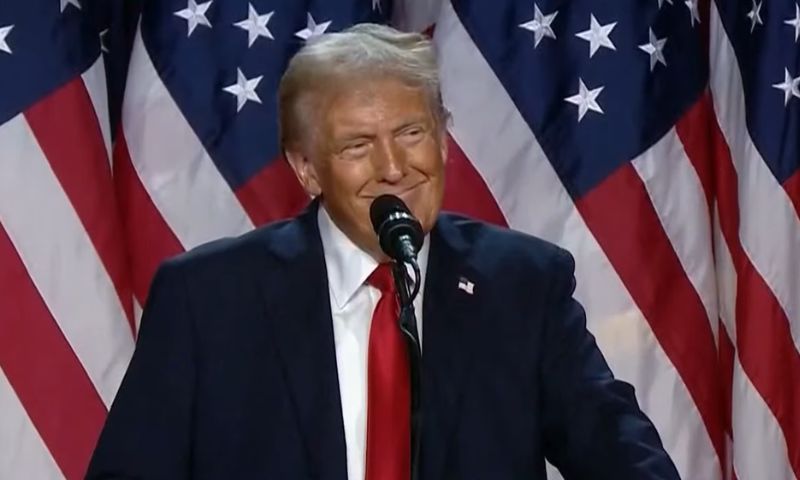WASHINGTON: After a decisive victory in the US presidential election, Donald Trump is expected to act swiftly and aggressively to implement steep tariffs on imports once he takes office, a move that has sent ripples through global trade circles.
Former trade advisers and officials, cited by Financial Times, said that Trump, known for his “tariff man” persona, could implement unprecedented tariff measures as he returns to office, raising concerns among America’s major trading partners.
The president-elect has openly discussed imposing tariffs as high as 20 percent on all imports and up to 60 percent on goods from China, a drastic escalation from the trade policies of his first term.
Analysts predict that Trump could invoke executive powers, such as the International Emergency Economic Powers Act (IEEPA), to quickly enforce these tariffs after his inauguration on January 20. The IEEPA grants the president broad authority to impose economic sanctions in response to perceived national threats.
While some of Trump’s allies argue that his approach is a negotiating tactic to leverage cooperation on issues beyond trade, others say that the president-elect has historically followed through on such promises.
“He is very much someone who does what he says he’s going to do,” said Everett Eissenstat, a former Trump trade adviser as quoted by the Financial Times. “He has been transparent about how he would use tariffs, and he won [the election]. So it’s hard to argue that the American people don’t want that.”
Wendy Cutler, vice-president of the Asia Society Policy Institute, urged global trade partners to take Trump’s intentions seriously. “Our trading partners need to take seriously Trump’s plans to increase tariffs,” she said as quoted by Financial Times.
Analysts believe Trump will leverage the US’s role as the world’s largest consumer market to pressure other nations into concessions. Dmitry Grozoubinski, a former World Trade Organization negotiator, observed that US consumer spending, which has remained robust since the COVID-19 pandemic, provides Trump with a significant advantage.
“Confronted with loss of access to the US, the engine of global growth, leaders will either bend the knee and negotiate concessions or punch back to bring some leverage of their own,” he said.
Tariffs and Their Impact on Trade Relationships
If Trump follows through, his aggressive tariff strategy could reshape global trade dynamics. Mexico, the US’s largest trading partner, has already faced threats of massive tariffs. Trump recently warned of a blanket 25 percent tariff on Mexican goods if President Claudia Sheinbaum fails to address illegal immigration and drug trafficking into the US.
ALSO READ: Xi Jinping Calls for Renewed U.S.-China Dialogue with Trump
There is even speculation that Trump could override the USMCA trade agreement, which he signed with Mexico and Canada during his first term, to enforce tariffs as high as 100 or even 1,000 percent on certain Mexican imports. President Sheinbaum sought to reassure Mexicans, stating, “I am convinced that we will maintain a strong relationship with our top trading partner.”
Political risk consultant Carlos Ramírez cautioned, however, that Sheinbaum’s confidence may overlook the volatility that Trump’s return could bring to US-Mexico trade relations. “They assume it won’t get worse or that they’ll negotiate a deal because the US needs Mexico. It won’t be a smooth ride,” he warned.
Migration experts also believe that Trump will pressure Mexico to sign a third safe country agreement, effectively blocking asylum seekers who travel through Mexico from reaching the US. Such a deal could be complicated by Trump’s proposed mass deportation of undocumented migrants, many of whom are from Mexico.
Tensions Expected with the EU and UK
Trump’s tariff strategy is also likely to strain relations with the European Union. The president-elect has criticized the EU’s substantial trade surplus with the US and singled out Germany for selling cars to the US while importing few in return.
In response, the European Commission, which directs EU trade policy, has hinted at possible concessions, including increasing US imports of liquefied natural gas and removing tariffs on €4.8 billion worth of US goods. However, the EU has also prepared a list of retaliatory tariffs in case negotiations falter, though any action would be limited by World Trade Organization rules.
ALSO READ: When will Trump Take Oath as 47th President of USA?
In the UK, trade experts predict a complicated path ahead. With a new government working to reset trade ties with the EU, the UK finds itself in a delicate position as it navigates between Trump’s demands and European expectations. Allie Renison from consultancy SEC Newgate described the UK’s role as “piggy in the middle,” adding, “The UK will need to negotiate carefully to maintain trade relations on both sides.”
Uncertain Future with China
During his first term, Trump’s trade strategy primarily targeted China, the US’s largest trade partner at the time. Using Section 301 of the 1974 Trade Act, he justified tariffs on $360 billion in Chinese imports, citing alleged violations of trade agreements. Trump also invoked national security concerns to impose tariffs on steel and aluminum imports from various countries, including China.
Should Trump deploy even higher tariffs on Chinese goods, Beijing could respond with a depreciation of its currency, the renminbi, to make its exports more competitive. Experts warn this would only heighten trade tensions between the two economic superpowers. With China’s exports to the US still growing, tensions are expected to remain a significant component of US-China relations under Trump’s leadership.
Challenges of Reversing Tariff Policies
Analysts warn that once Trump enacts new tariffs, they will likely be difficult to reverse. Adam Posen, president of the Peterson Institute for International Economics, said as quoted by Financial Times, “If the US can credibly extract what they want without implementing these tariffs, that would be a good outcome in the short term. But history shows that once tariffs are imposed, it’s very hard to remove them.”


























